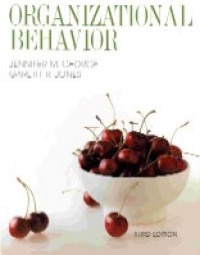
Understanding and managing organizational behavior
| Gmd : Text
| Availability :
| 00000009240 | HD58.7 .G467 2002 | (General Book) | Available - Ada |
George/Jones offers comprehensive concept coverage and a focus on only the most current, proven theories. This edition offers a wealth of leaning tools that actually show students how OB can help them become better managers.
Table of Contents:
(NOTE: Each chapter begins with an Opening Case, and ends with a Summary, Organizational Behavior in Action, and a Closing Care.)
1. Organizational Behavior and Management.
What Is Organizational Behavior? Organizational Behavior and Management. Challenges for Organizational Behavior and Management. Challenge 1: Using New Information Technology to Enhance Creativity and Organizational Learning. Challenge 2: Managing Human Resources to Increase Competitive Advantage.Challenge 3: Developing Organizational Ethics and Well-Being.Challenge 4: Managing a Diverse Workforce. Challenge 5: Managing the Global Environment.
I. INDIVIDUALS IN ORGANIZATIONS.
2. Individual Differences: Personality and Ability.
The Nature of Personality. The Big Five Model of Personality. Other Organizationally Relevant Personality Traits. The Nature of Ability. The Management of Ability in Organizations.
3. The Experience of Work: Values, Attitudes, and Moods.
Work Values, Attitudes, and Moods. Job Satisfaction. Theories of Job Satisfaction. Potential Consequences of Job Satisfaction. Organizational Commitment.
4. Perception, Attribution, and the Management of Diversity.
The Nature of Perception. Characteristics of the Perceiver. Characteristics of the Target and Situation. Biases and Problems in Person Perception. Attribution Theory. Effectively Managing a Diverse Workforce.
5. Learning in Organizations.
The Nature of Learning. Operant Cnditioning: Increasing the Probability of Desired Behaviors. Operant Conditioning: Reducing the Probability of Undesired Behaviors. Operant Conditioning in Practice: Organizational Behavior Modification. Social Learning Theory. The Learning Organization.
6. The Nature of Work Motivation.
What Is Work Motivation? Why People Do What They Do: Theories of Wok Motivation. Need Theory. Expectancy Theory. Equity theory. Procedural Justice Theory.
7. Motivation Tools I: Job Design and Goal Setting.
Job Design: Early Approaches. Job Design: The Job Characteristics Models. Job Design: The Social Information Processing Model. Job Design: Models Summarized. Goal Setting. Goal Setting and Job Design as Motivation Tools.
8. Motivation Tools II: Performance Appraisal, Pay, and Careers.
The Role of Performance Appraisal in Motivation. Pay as a Motivation Tool. Motivation through Career Opportunities. Contemporary Career Challenges.
9. Stress and Work-Life Linkages.
The Nature of Stress. Sources of Stress. Coping with Stress.
II. GROUPS AND ORGANIZATIONAL PROCESSES.
10. The Nature of Work Groups.
Introduction to Groups. Characteristics of Work Groups. How Groups Control Their Members: Roles and Rules. How Groups Control Their Members: Group Norms. Socialization: How Group Members Learn Roles, Rules, and Norms.
11. Effective Work Groups and Teams.
Process Losses, Process Gains, and Group Effectiveness. Social Loafing: A Problem in Group Motivation and Performance. Group Tasks and Group Performance: Thompson's Model of Task Independence. Group Cohesiveness and Group Performance. Important Organization Groups.
12. Leadership.
Introduction to Leadership. Early Approaches to Leadership. Fiedler's Contingency Theory of Leadership. Contemporary Perspectives on Leadership. Does Leadership Always Matter in Organizations? New Topics in Leadership Research. Recap of Leadership Approaches.
13. Communication.
What Is Communication? The Functions of Communication. The Communication Process. Selecting an Appropriate Communication Medium: Information Richness and New Information Technologies. Communication Networks in Organizations.
14. Decision Making.
Types of Decisions. The Decision-Making Process. Sources of Error in Decision-Making. Group Decision-Making. Group Decision-Making Techniques. Creativity.
III. INTERGROUP RELATIONS AND THE ORGANIZATIONAL CONTEXT.
15. Organizational Structure and Culture.
Organizational Structure, Culture, and Design. Differentiation: Grouping Organizational Activities. Integration: Mechanisms for Increasing Coordination.
What Is Organizational Culture?
16. Determinants of Organizational Structure and Culture.
The Organization's Environment. The Organization's Technology and Tasks. The Organization's Strategy.
17. Managing Global Organizations.
Developing Global Understanding. Managing the Global Environment. Global Strategy and Structure. Managing Global Human Resources.
18. Power, Politics, and Conflict.
The Nature of Power and Politics. Sources of Individual Power. Sources of Functional and Divisional Power. Organizational Politics: The Use of Power. What is Organizational Conflict? Pondy's Model of Organizational Conflict. Conflict Management Techniques.
19. Organizational Change and Development.
Forces for and Resistance to Change. Organization-Level Resistance to Change. Evolutionary and Revolutionary Change in Organizations. Managing Change: Action Research. Organizational Development.
Appendix.
About the authors:
Jennifer M. George is the Mary Gibbs Jones Professor of Management and Professor of Psychology in the Jesse H. Jones Graduate School of Management at Rice University. She received her B.A. in Psychology/Sociology from Wesleyan University, her M.B.A. in Finance from New York University, and her Ph.D. in Management and Organizational Behavior from New York University. Prior to joining the faculty at Rice University, she was a Professor in the Department of Management at Texas A&M University.
Gareth Jones received both his B.A. and Ph.D. from the University of Lancaster, U.K. He previously held teaching and research appointments
at the University of Warwick, Michigan State University, and the University of Illinois at Urbana-Champaign. Professor Jones specializes in both organizational behavior and organizational theory and is well known for his research on socialization, culture, and applying transaction cost analysis to explain many forms of intraorganizational and interorganizational behavior. He also has published many articles in leading journals of the field and is one of the most prolific authors in the Academy of Management Review. One of his articles won the Academy of Management Journal Best Paper Award. He is, or has been, on the editorial review boards of the Academy of Management Review, the Journal of Management, and Management Inquiry.
| Series Title |
-
|
|---|---|
| Call Number |
HD58.7 .G467 2002
|
| Publisher Place | Upper Saddle River |
| Collation |
xxiii, 728p.: col.ill.; 28cm.
|
| Language |
English
|
| ISBN/ISSN |
0130411027
|
| Classification |
HD58.7
|
| Media Type |
-
|
|---|---|
| Carrier Type |
-
|
| Edition |
3rd ed.
|
| Subject(s) | |
| Specific Info |
-
|
| Statement |
-
|
| Content Type |
-
|
No other version available







